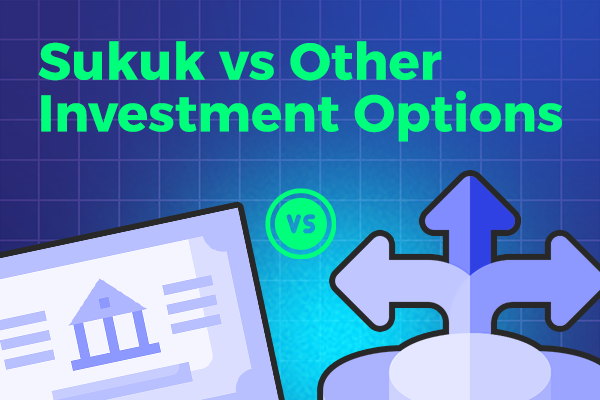Investors are always on the lookout for new and innovative investment opportunities that offer a unique blend of risk and returns. One such investment option that has been gaining traction in recent years is Sukuk.
Sukuk investments are Islamic financial instruments that are increasingly being used by investors looking for Sharia-compliant investment options. Sukuk offer investors an alternative way of investing their money, providing a risk profile that is different from other investment options.
Key Takeaways:
- Sukuk investments are a unique way to diversify an investment portfolio.
- Sukuk offer a different risk profile compared to other investment options.
- Sukuk are a growing area of the investment market.
Understanding Sukuk Investments
Sukuk investments are a form of Islamic finance, which operates on the principles of Sharia law. Sukuk, also known as Sharia-compliant bonds, are structured to comply with Islamic law and ethical investment principles by abstaining from interest payments and investments in forbidden industries such as gambling, tobacco, and alcohol.
The Sukuk market has been growing steadily over the past few decades, with a wide range of issuers including governments, corporations, and financial institutions. Sukuk issuance has been particularly popular in the Middle East and Southeast Asia, but has also gained popularity in other regions around the world.
Sukuk investments follow several structures. The most common Sukuk structures include Ijarah or lease-based Sukuk, Musharakah or partnership-based Sukuk, and Wakalah or agency-based Sukuk. In an Ijarah Sukuk, the issuer uses the proceeds to purchase an asset that is then leased to the client. In a Musharakah Sukuk, the issuer enters into a partnership with the client to fund a project. In a Wakalah Sukuk, the issuer acts as an agent on behalf of the investors to invest the proceeds in Sharia-compliant ventures.
Sukuk investments offer unique benefits to investors, including diversification opportunities and exposure to different geographic regions and sectors. As such, Sukuk has become an attractive investment option for both Islamic and non-Islamic investors alike.
Comparing Risk and Returns
Investors are always seeking investment options that offer a balance between risk and reward. When it comes to Sukuk investments, the risk and returns profile differs considerably from traditional investment options.
Sukuk investments offer unique risk profiles due to their adherence to Islamic principles. Since they are Sharia-compliant, Sukuk investments do not involve interest payments, and the investment returns are derived from profits generated by the underlying assets.
Compared to other investment options such as stocks or bonds, Sukuk investments may have relatively lower returns, but they also have a lower degree of risk. Sukuk investments generally offer fixed income with a predetermined rate of return, adding a level of certainty that is appealing to conservative investors.
One major difference between Sukuk investments and traditional bonds is the credit risk associated with the issuer. In traditional bonds, an issuer’s credit rating determines the bond’s value. However, in Sukuk investments, the underlying assets determine the bond’s value. This feature makes Sukuk investments more immune to credit risk, as the bond’s value depends on the quality and performance of the underlying assets.
In summary, while Sukuk investments may not offer the highest returns, they have a lower degree of risk compared to other investment options. This makes them an attractive investment option for those seeking consistent and predictable returns while keeping risk levels in check.
Diversification Potential of Sukuk
Investors seek to diversify their investments in order to reduce risk and increase potential returns. The diversification potential of Sukuk investments can make them an attractive addition to an investment portfolio. Unlike other investment options that may be limited to specific sectors or geographic regions, Sukuk can provide exposure to a wide range of sectors and regions. This can help spread risk and enhance portfolio diversification.
For example, Sukuk may be issued to fund infrastructure projects in emerging markets, providing investors with exposure to the growth potential of these economies. Additionally, Sukuk issued by companies in different sectors, such as real estate or energy, can provide exposure to diverse industries.
| Investment Option | Diversification Potential |
| Sukuk | High |
| Stocks | Moderate |
| Bonds | Low to Moderate |
Compared to stocks and bonds, Sukuk has a higher diversification potential. Stocks are limited to specific sectors and geographic regions, and the risk is concentrated in the performance of individual companies. Bonds may offer exposure to multiple sectors and regions, but the diversification potential is still lower compared to Sukuk.
It is important to note that even with the potential for diversification, Sukuk investments are not without risk. The performance of Sukuk investments is dependent on various factors, including economic conditions and the creditworthiness of the issuer. However, by incorporating Sukuk investments into an investment portfolio, investors can potentially reduce risk and achieve higher returns over the long term.
Conclusion
Overall, Sukuk investments offer a unique alternative to other investment options. While they may not be suitable for every investor, they provide benefits that should be considered. Sukuk investments adhere to Islamic principles, providing a unique risk profile compared to other investments. This can be especially valuable for those seeking diversification in their portfolios.
Investors should also consider the potential returns of Sukuk investments. While they may not offer the highest returns, they provide a stable and predictable income stream, making them an attractive option for those seeking a steady return on investment.
Finally, Sukuk investments offer excellent diversification potential. They provide exposure to different sectors and geographic regions, which can help spread risk and enhance portfolio diversification.
In Conclusion
While Sukuk investments may not be as well-known as other investment options, they offer unique benefits that should be considered. Investors should carefully consider their investment objectives and risk tolerance before investing in Sukuk. However, for those seeking a stable and predictable income stream, exposure to different sectors and geographic regions, and a unique risk profile, Sukuk investments are certainly worth exploring further.


